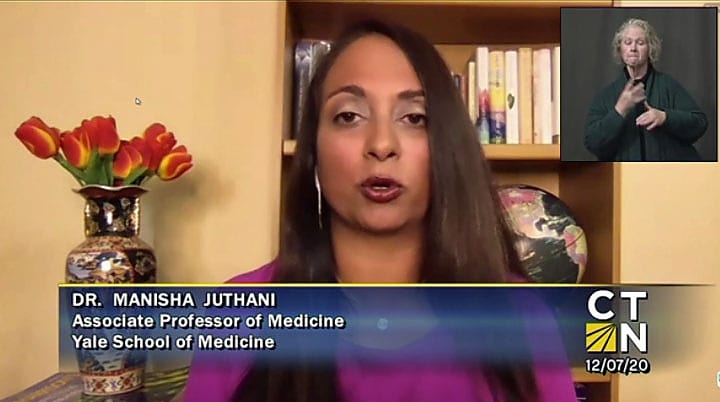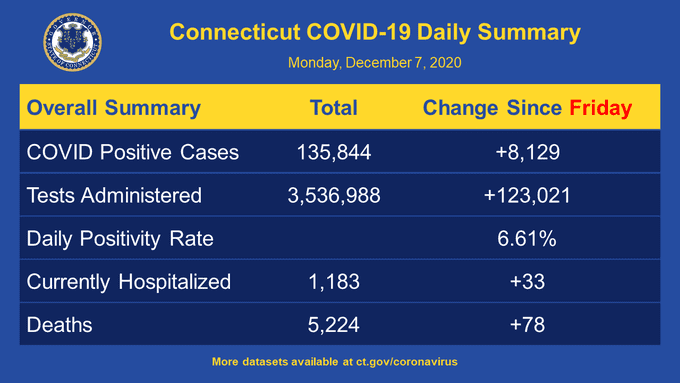Lamont Eyes Regional Approach on Indoor Dining Restrictions

Audio By Carbonatix

Courtesy CT-N
According to data reported by the state Monday, there were 137 new positive cases of COVID-19 among West Hartford residents over the past three days, and one fatality.

By Hugh McQuaid, CTNewsJunkie.com
Even as he resisted calls to close indoor dining at Connecticut restaurants to slow the pandemic, Gov. Ned Lamont invited a doctor making the case for closing them to speak during Monday’s COVID-19 press briefing.
During the news briefing, Dr. Manisha Juthani praised Lamont’s leadership through the pandemic saying, “We really crushed the curve” with the state’s mask mandate in April. But the governor and the Yale New Haven Hospital physician remained apart on the steps needed now as all major virus indicators continue to climb.
As of Monday, there were 1,183 COVID patients in Connecticut hospital beds – an increase of 33 over the past three days – and the state positivity rate was at a three-day average of 6.61%, with a seven-day rolling average of 6.5%/ Seventy-eight people had died from the virus since Friday.
“I feel that indoor dining is very risky,” Juthani said during the briefing. “I don’t think it’s necessary to continue at this point.”
Juthani was one of dozens of doctors who signed a letter to the governor last month, urging him to close gyms and restaurant dining areas to slow the spread of the virus before the state’s hospital system becomes overwhelmed. Lamont met with the group last week but said afterward that he would not “govern by fiat.”
On Monday, Lamont called indoor dining a “real risk,” but he seemed to be waiting for other states in the region to take the first step toward curtailing them further. For the moment, the indoor dining capacity at Connecticut restaurants remains capped at 50%. New York Gov. Andrew Cuomo, speaking at a fundraiser Tuesday for Lamont and the Connecticut Democratic Party, signaled Monday he would restrict the capacity in his state to 25% if hospitalizations in the region had not stabilized after five days.
“If I shut that down, where do they go? Maybe they can’t go to Andrew Cuomo’s state but they go to [Massachusetts Gov.] Charlie Baker’s state or they go to one of those indoor parties,” Lamont said. “As I’ve said many times, if I can do this in regional coordination it makes it a lot more effective.”
Lamont noted that the restaurant industry in Connecticut has already seen a bruising year. He said the industry’s reservations were down by 43% in November and significantly more than that during the first week of December.
The Connecticut Restaurant Association estimated last month that more than 600 restaurants had closed this year with no plans to reopen. In a letter to Lamont and other policymakers last week, Scott Dolch, the group’s executive director, said the industry was “on the verge of collapse.”
While it remains unclear if Congress will pass another pandemic relief package, Dolch has appealed to the governor for state grants to prop up the industry. In the past, Lamont has said that keeping dining open was the best he could do.
In a statement Monday, Dolch said Lamont was sending mixed messages to restaurants who have been operating safely since June. He said many were now “worried about being left out in the cold” without additional assistance.
“The message from today’s press conference seemed to be either that restaurants are to blame, or that shutting down indoor dining would solve the problem, neither of which is true. What is true is that neighboring states are putting far more money into programs designed to help local businesses survive the months ahead,” he said.
Juthani seemed sympathetic to the state’s restaurant industry, even as she urged that the state close indoor dining. She suggested that Connecticut residents should order takeout from local restaurants and tip the staff working there.
“Restaurants have done the best they can given the nature of restaurant dining. I miss restaurant dining. I wish I would feel comfortable to go back. My reason for discomfort is not because of their lack of preparation,” she said.
Juthani said she was also concerned about transmission at casinos and tanning salons. But she called restaurants an “obvious place” where people sit near each other without masks for long periods of time.
“I do not say that without understanding the implication of that, and I don’t say that this would be forever. I think the month of December is a very high-risk month. We have holidays coming up,” she said. “Then January is going to be another heavy month for infections because it’s going to be the price we pay for December.”
Republished with permission from CTNewsJunkie.com, all rights reserved.
Like what you see here? Click here to subscribe to We-Ha’s newsletter so you’ll always be in the know about what’s happening in West Hartford! Click the blue button below to become a supporter of We-Ha.com and our efforts to continue producing quality journalism.



